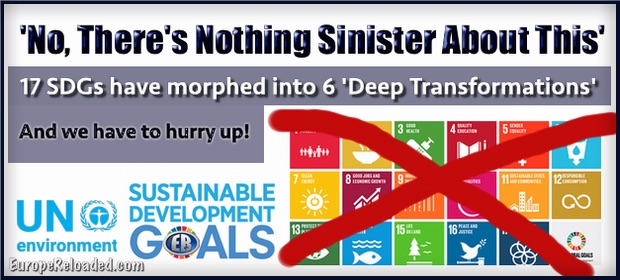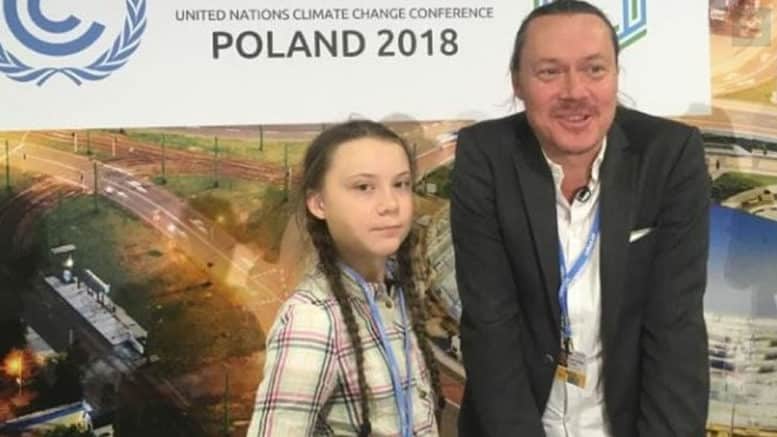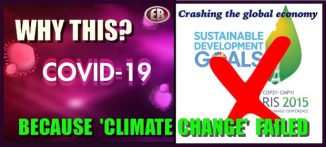
- Common Core (centralised educational programming, which reduces academic attainment levels); teaching gender as a construct (promoting the injuring of already mentally fragile kids; pushing the LGBT agenda and sexual practices, while confusing the rest)
- vaccines and the Big Pharma agenda
- more deindustrialization (i.e. unemployment); green-tech development benefitting corporation by scooping up our tax money
- moving even more people off the land, defunding rural areas; turning the land over to corporations to control our food supply and water sources
- 5G military technology and all other surveillance technologies being used on us
The first sentence of the last paragraph of the article republished below echoes the usual globalist fear-mongering: “By achieving change in these six key areas, we can save both people and planet.” Let’s remind ourselves that the climate change agenda upon which all this is based is utter fakery, that there is NOTHING we need saving from, except these very people working for the UN elite.
UN’s Sustainable Development Calls For ‘Deep Transformation’
TECHNOCRACY NEWS

Sustainable Development represents the final plundering of the planet by the global elite, and the lockdown of Technocracy, or Scientific Dictatorship. The UN has been using the term ‘deep transformation’ for years but people have paid no attention to what it implies. ⁃ TN Editor
SCIENCE DAILY
The Sustainable Development Goals and the Paris Agreement on Climate Change call for deep transformations that require complementary actions by governments, civil society, science, and business. IIASA contributed to a new study outlining six major transformations that will be required to achieve these ambitious goals.
The UN Sustainable Development Goals (SDGs) focus on time-bound targets for prosperity, people, planet, peace, and partnership — collectively known as the five Ps. By adopting the 2030 Agenda with its 17 SDGs and the Paris Climate Agreement, UN member states effectively created a framework for national action and global cooperation on sustainable development, while the Paris Agreement committed signatory countries to achieving net-zero greenhouse gas emissions by the middle of the century. SDG 13 on climate change specifically links to the Paris Agreement noting that the UN Framework Convention on Climate Change “is the primary international, intergovernmental forum for negotiating the global response to climate change.” Despite the interconnectivity and clear aims of these global goals, stakeholders seem to lack a shared understanding of how the 17 SDGs can be operationalized.
Building on previous work by The World in 2050 — a global research initiative established by IIASA — the authors of the study published in the journal Nature Sustainability propose six transformations to organize SDG interventions through a semi-modular action agenda that can be designed by discrete, yet interacting, parts of government. According to the paper, the proposed framework may be operationalized within the structures of governments while still respecting the strong interdependencies across the 17 SDGs. The authors also outline an action agenda for science to provide the knowledge required for designing, implementing, and monitoring the SDG Transformations.
“The 2030 Agenda and the Paris Agreement have given the world an aspirational narrative and an actionable agenda to achieve a just, safe, and sustainable future for all within planetary boundaries. The six transformations provide an integrated and holistic framework for action that reduces the complexity, yet encompasses the 17 SDGs, their 169 targets, and the Paris Agreement. They provide a new approach to shift from incremental to transformational change; to identify synergies using sustainable development pathways; formulate actionable roadmaps; and a focus on inter-relationships to uncover multiple benefits and synergies,” explains study co-author Nebojsa Nakicenovic, executive director of The World in 2050 (TWI2050) research initiative at IIASA.
In their paper the researchers considered which key interventions would be necessary to achieve the SDG outcomes and how their implementation might be organized into a limited set of six transformations, namely 1) education, gender, and inequality; 2) health, wellbeing, and demography; 3) energy decarbonization and sustainable industry; 4) sustainable food, land, water, and oceans; 5) sustainable cities and communities; and 7) digital revolution for sustainable development. To simplify the discussion of interlinkages between interventions and SDGs, the authors further identified intermediate outputs generated by combinations of interventions, which in turn contribute to the achievement of each SDG. Each SDG transformation describes a major change in societal structure (economic, political, technological, and social) to achieve long-term sustainable development, while also each contributing to multiple SDGs. Excluding any of them would make it virtually impossible to achieve the SDGs.
Pursuing the six transformations will require deep, deliberate, long-term structural changes in resource use, infrastructure, institutions, technologies, and social relations, which have to happen in a relatively short time window. Previous societal transformations, like industrialization in 19th century Europe, were initiated by technological changes like the steam engine and were largely undirected, while 20th century technologies like semiconductors, the Internet and Global Positioning Systems, were promoted through directed innovation to meet military aims. The authors emphasize that it is crucial that SDG transformations are formally directed in order to meet time-bound, quantitative targets, such as net-zero carbon emissions by mid-century.
************
Original article

••••
The Liberty Beacon Project is now expanding at a near exponential rate, and for this we are grateful and excited! But we must also be practical. For 7 years we have not asked for any donations, and have built this project with our own funds as we grew. We are now experiencing ever increasing growing pains due to the large number of websites and projects we represent. So we have just installed donation buttons on our websites and ask that you consider this when you visit them. Nothing is too small. We thank you for all your support and your considerations … (TLB)
••••
Comment Policy: As a privately owned web site, we reserve the right to remove comments that contain spam, advertising, vulgarity, threats of violence, racism, or personal/abusive attacks on other users. This also applies to trolling, the use of more than one alias, or just intentional mischief. Enforcement of this policy is at the discretion of this websites administrators. Repeat offenders may be blocked or permanently banned without prior warning.
••••
Disclaimer: TLB websites contain copyrighted material the use of which has not always been specifically authorized by the copyright owner. We are making such material available to our readers under the provisions of “fair use” in an effort to advance a better understanding of political, health, economic and social issues. The material on this site is distributed without profit to those who have expressed a prior interest in receiving it for research and educational purposes. If you wish to use copyrighted material for purposes other than “fair use” you must request permission from the copyright owner.
••••
Disclaimer: The information and opinions shared are for informational purposes only including, but not limited to, text, graphics, images and other material are not intended as medical advice or instruction. Nothing mentioned is intended to be a substitute for professional medical advice, diagnosis or treatment.




